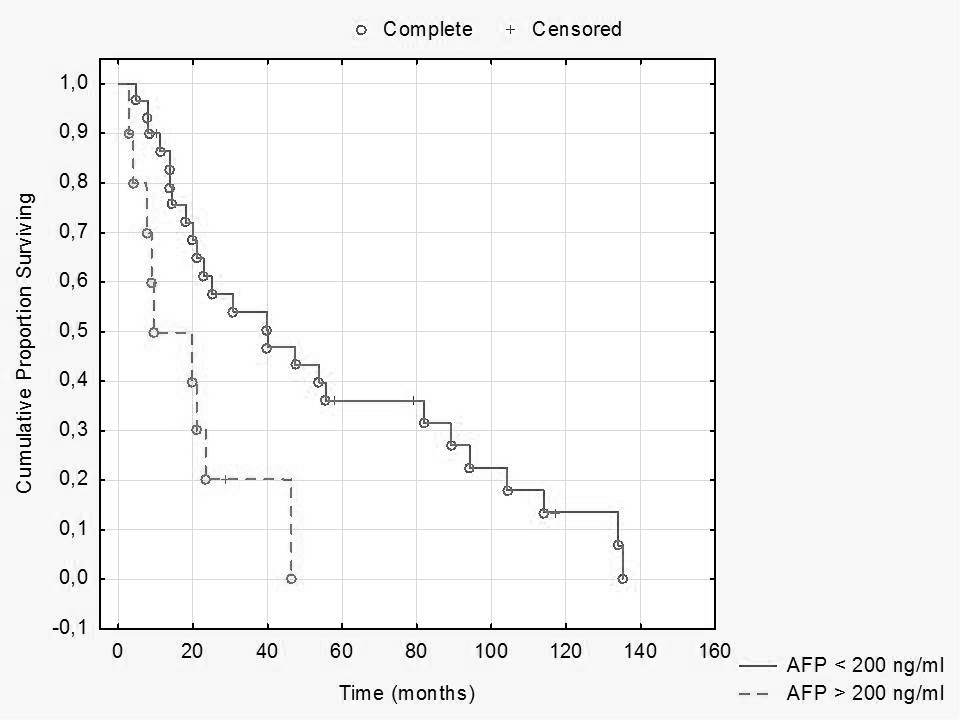Serum AFP Greater Than 200 ng/ml as a Predictor for Low Survival in Patients with Hepatocelullar Carcinoma Recurrence in a Brazilian Multicentric Study.
1Unit of Liver Transplantation, State University of Campinas, Campinas, SP, Brazil
2Digestive Surgery - Liver Transplantation, Faculty of Medicine- São Jose do Rio Preto, Rio Preto, SP, Brazil
3Digestive Surgery - Liver Transplantation, Faculty of Medicine, Federal University of Minas Gerais, Minas Gerais, Brazil
Meeting: 2017 American Transplant Congress
Abstract number: A80
Keywords: Hepatocellular carcinoma, Liver transplantation, Risk factors, Tumor recurrence
Session Information
Session Name: Poster Session A: Clinical Science: Liver - Hepatocellular Carcinoma and Cholangiocarcinoma Malignancies
Session Type: Poster Session
Date: Saturday, April 29, 2017
Session Time: 5:30pm-7:30pm
 Presentation Time: 5:30pm-7:30pm
Presentation Time: 5:30pm-7:30pm
Location: Hall D1
Introduction: Liver transplantation (LT) is the only potential curative treatment for hepatocellular carcinoma (HCC) with recurrence (HCC-R) diagnosed in 16%. Aim: The objective of this study was to evaluate HCC-R risk factors . Methods: From 1998 to 2015, 2,093 LT / 194 HCC / 40 RHCC was diagnosed from HC – Unicamp, Faculty of Medicine – São Jose do Rio Preto/SP and Clinical Hospital at Minas Gerais Federal University with histological confirmation of the relapse disease. Clinical and surgical information, radiological and pathological reports and information about the donor contained in the medical records were analyzed. Results: Most of the patients were male and had chronic liver disease caused by viral hepatitis. Only 37.5% were submitted to chemoembolization and 50% had cold ischemia time > 8 hours. In the explant analysis, most of the patients were beyond the Milan criteria and classified as stage II/III of Edmonson – Steiner and 37.5% had microvascular invasion. The donors were mostly male and the ICU time was longer than 3 days. Only in 25% of cases the levels of serum alpha-fetoprotein (AFP) > 200 ng/mL. The Kaplan-Meier survival curve according to AFP > 200 ng/ml had lower survival (P=0.02), and Cox regression test showed as risk factors: older donors (P=0.037; Beta=0.04; 0,005-0,078) and trend to major nodule > 3 cm (P=0.06; Beta=-0,11-0,43) (Figure 1), higher AFP (mean = 1,063); had higher microvascular invasion number , AFP level (1,063.0 x 153.1 ng/ml) Conclusion: Pre transplantation AFP > 200 ng/dl was associated with lower survival, older donors and microvascular invasion.
CITATION INFORMATION: Boin I, Possatto M, Ataide E, Silva R, Silva R, Felicio H, Amado L, Lima A, Seva-Pereira T. Serum AFP Greater Than 200 ng/ml as a Predictor for Low Survival in Patients with Hepatocelullar Carcinoma Recurrence in a Brazilian Multicentric Study. Am J Transplant. 2017;17 (suppl 3).
To cite this abstract in AMA style:
Boin I, Possatto M, Ataide E, Silva R, Silva R, Felicio H, Amado L, Lima A, Seva-Pereira T. Serum AFP Greater Than 200 ng/ml as a Predictor for Low Survival in Patients with Hepatocelullar Carcinoma Recurrence in a Brazilian Multicentric Study. [abstract]. Am J Transplant. 2017; 17 (suppl 3). https://atcmeetingabstracts.com/abstract/serum-afp-greater-than-200-ngml-as-a-predictor-for-low-survival-in-patients-with-hepatocelullar-carcinoma-recurrence-in-a-brazilian-multicentric-study/. Accessed March 1, 2026.« Back to 2017 American Transplant Congress
